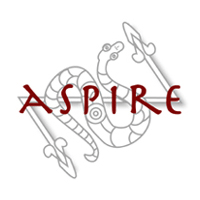Welcome to the ASPIRE Resources Website
In 2004 all Scottish Sites and Monuments Records (SMRs), the Royal Commission on the Ancient and Historical Monuments of Scotland (RCAHMS), Historic Scotland and the Scottish archaeological contracting units took a joint decision that reporting of archaeological events generating new information should conform to a standard form and procedure. The result is ASPIRE, an Archaeological Standard Protocol for the Integrated Reporting of Events. ASPIRE rigorously specifies data structure, data type and required fields for reporting new archaeological information to SMRs and the RCAHMS.
From April 2006 compliance with the ASPIRE protocol will be enforceable via the development control process nationally as agreed by ARIA, as well as being a condition of grant/contract for Historic Scotland funds. In addition, its use, alongside Discovery and Excavation in Scotland, is actively promoted and encouraged by the Council for Scottish Archaeology and others, for non-commercial archaeological events such as academic and amateur surveys and excavations that produce significant amounts of infromation.
The adoption of ASPIRE will form one element of a more coherent data management strategy comprising complementary projects such as OASIS, FISH-XML and Pastmap. These are intended to make access to both national and local datasets easier, as well as making those datasets more reliable and up to date, and exemplify a spirit of cooperation between national and local government bodies, archaeological trusts and the commercial archaeological sector.
This website contains all the information you need to make your project ASPIRE compliant, as well as facilitating access to downloadable versions of ASPIRE documentation and template databases. This site will be used to keep all active archaeologists up to date with developments in the ASPIRE protocol, as well as forthcoming training and promotional events.
The full text of the protocol is available as a PDF document from the downloads page.

